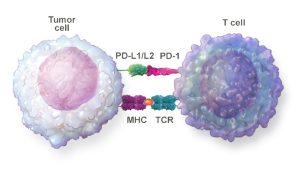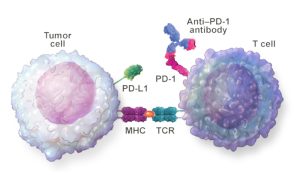Systemic Treatment
There are several types of chemotherapy treatments:
Taxanes – Disrupt the division of cancer cells, including Taxol, Taxotere, Abraxane.
Anthracyclines – Damage the genetic material of cancer cells, including Adriamycin, Doxil.
Platinum-Based Treatments – Carboplatin and Cisplatin, which bind to the genetic material of cancer cells, causing damage and hindering their growth and division.
Nucleoside-Targeting Treatments – Such as Gemzar (Gemcitabine), a chemotherapy drug that disrupts DNA production in cancer cells, preventing their proliferation and causing cell death.
Chemotherapy is often administered in combinations, such as Carbo-Taxol or Carbo-Gemzar. Treatments are usually given every three weeks (standard protocol), though a weekly schedule with a rest week between cycles is also possible. Consult your oncologist to determine the best option for you.
Jemperli (Dostarlimab) is an immunotherapy drug designed to help the patient’s immune system target and destroy cancer cells. It is approved for use in women with advanced dMMR/MSI-H endometrial cancer, or in cases of cancer that has progressed after platinum-based chemotherapy.
The immune system comprises various cell types that primarily identify and fight foreign invaders. Additionally, it can recognize and eliminate abnormal cells, preventing cancer development. However, some cancer cells can evade immune detection, allowing them to survive, grow, and spread.
One mechanism cancer cells use to evade the immune system is the “immune checkpoint.” This natural control mechanism prevents incorrect cell destruction. It involves the PD-L1 protein on cancer cells binding to the PD-1 protein on T-cells, which deactivates the T-cells and prevents them from destroying the cancer cells. Some cancer cells acquire genetic mutations that enable them to express PD-L1, thus avoiding immune attack.

Dostarlimab is a monoclonal antibody targeting PD-1. By binding to PD-1, it prevents its interaction with PD-L1 on cancer cells, allowing the immune system to destroy the cancer cells.

Clinical studies have shown that immune checkpoint inhibitors are particularly effective in cancers with the dMMR/MSI-H genetic marker, making these patients more likely to respond to such treatments.
Keytruda (Pembrolizumab)
This drug helps immune cells fight tumors by blocking the interaction between PD-L1 on cancer cells and PD-1 on T-cells, restoring the T-cells’ ability to attack cancer.
Keytruda is effective for tumors with high mutation rates or high microsatellite instability (MSI-H), or for those expressing dMMR. It is approved for treating endometrial cancer expressing dMMR, and is included in the “healthcare basket” for these patients starting from second-line therapy. For patients with endometrial cancer expressing pMMR, it is used in combination with Lenvima (lenvatinib). For cervical cancer patients with high CPS expression, Keytruda is given as first-line therapy with chemotherapy and has been included in the “healthcare basket” since 2023.
Avastin (Bevacizumab)
Cancerous tumors develop an extensive blood vessel network to grow and survive. Angiogenesis inhibitors, such as Avastin or MVASI, interfere with the development of these blood vessels, thereby cutting off the tumor’s supply of blood, oxygen, and other essential nutrients needed for its growth.
Lynparza (Olaparib), Rubraca (Rucaparib), Zejula (Niraparib) – PARP Inhibitors
PARP is a protein within cells that helps repair DNA damage. Cancer cells, which carry DNA defects, rely on PARP to repair these defects. PARP inhibitors block the supply of PARP proteins to cancer cells, preventing the repair of DNA damage, promoting cancer cell death, stopping growth or shrinking the tumor. These drugs are suitable for ovarian cancer patients with a BRCA mutation or a positive HRD test.
TKI Inhibitor – Lenvatinib (Lenvima)
Lenvima targets cancer in two ways. First, it blocks signals that cause cancer cells to grow, which can lead to the death of these cells. It also inhibits the ability of cancer cells to develop new blood vessels, meaning they are deprived of the oxygen and nutrients needed to survive, potentially causing the tumor to shrink or stop growing. This treatment is used in combination with Keytruda for patients with metastatic or recurrent endometrial cancer expressing pMMR. Unfortunately, this treatment is not yet included in the “healthcare basket”, but we are working hard to have it included for the benefit of our patients.
We make every effort to provide evidence-based and reliable health information. We invest significant time and resources to ensure the information on our website is as accurate and up-to-date as possible, supported by scientific sources and aligned with current professional knowledge in relevant fields. However, the information in this website does not constitute medical advice or recommendations. We encourage anyone seeking personalized advice or recommendations on medical matters to consult directly with a licensed physician or a certified healthcare professional in the relevant field.
Navigation
Postal address:
Shmu’el Shnitser St 3, Tel Aviv 6958312
